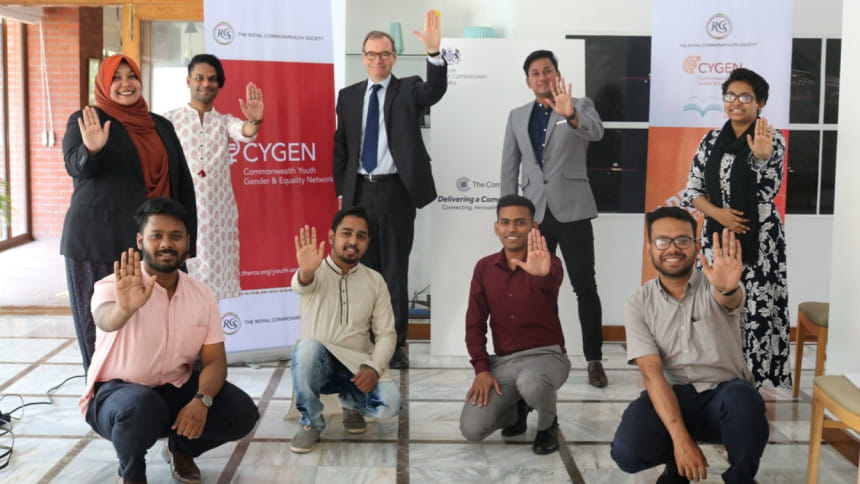Marching towards CHOGM to Ensure Gender Equality

This year, Commonwealth Day was observed on the very same day on which the world celebrated International Women's Day! Though the two events match with the same day, do the status quo of women's rights and gender equality essentially match with the 54 Commonwealth nations?
The drastic pandemic COVID-19 halted everything including the Commonwealth Heads of Government Meeting (CHOGM). For the meeting postponed to 2021, the theme is "Delivering a Common Future", which links to events such as #SheLeadstheWay and "Sea the She" which have been organized by the Commonwealth Secretariat to commemorate International Women's Day.
These events develop a paradoxical feel among those young Commonwealth citizens who thrive for a more competent, just and equal society and are ready to deliver a common future. When the celebration of International Women's Day coincides with Commonwealth Day, it reminds us of the colonial legacy that many of the Commonwealth countries are nevertheless carrying, especially the inherited laws that discriminate against women, girls and people with diverse sexual orientation, gender identity, gender expression and sex characteristic (SOGIESC). This legal discrimination represents not only a barrier to progress in human rights and gender equality, but also a barrier for the youth to step towards the "Common Future" that the upcoming CHOGM envisions.
Presently, there are more than 1.2 billion people under the age of 30 in the 54 countries of the Commonwealth, accounting for over 60 per cent of the combined population. In some of the member states, particularly in Africa, the youth demographic rises to 70 per cent. This giant number of young people remains a strength for the Commonwealth to advance democracy, human rights, gender equality, peace, and justice. Nevertheless, while legal discrimination is sustained, it is inevitable that this strength will be unused. Despite these barriers, Commonwealth youths are on the run to address such issues in various platforms. Demanding the elimination of discriminatory laws remains the utmost priority among the youths which they want to highlight during the CHOGM 2021.
"#Reform53 - Together for Legal Equality" is such an advocacy campaign, which is currently being run by the Commonwealth Youth Gender and Equality Network (CYGEN) and which calls for the leaders of all 54 Commonwealth countries to reform laws that discriminate against women, girls and people with diverse SOGIESC. Leading up to CHOGM 2021 in Rwanda, #Reform53 aims to spark conversations, commitments and actions toward achieving the following: 1) Decriminalizing consensual same sex relationships; 2) Reforming consent laws on forced marriage and removing clauses that defer to customary laws; 3) Ensuring provisions in law for abortion by choice; 4) Ending workplace discrimination for women and people with diverse SOGIESC; and 5) Increased political participation for women and people with diverse SOGIESC.
Bangladesh is one of the focus countries for the #Reform53 campaign. According to young activists, Bangladesh has an amazing blend of economic progress and government willingness to ensure gender equality. This faithful harmony is indeed in favor of resulting in a legal reform that can prevent early and forced marriage.
According to findings from the 2019 Multiple Indicator Cluster Survey, conducted by the Bangladesh Bureau of Statistics with the support of UNICEF, child marriage still remains widely accepted with 51.4 per cent of women aged 20-24 years first married before their 18th birthday, and 15.5 per cent of women first married before their 15th birthday. These statistics are not only startling but frustrating too.
It is more alarming if we put a spotlight on the situation post-COVID. In a recent document, UNESCO reported that, due to the coronavirus, schools and other educational institutes globally faced closure in around 188 countries. This closure alone affected around 1,543,446,152 learners, comprising 89.5% of total enrolled learners worldwide. If we look at the learnings from how Ebola affected developing countries, we can see that many affected girls are no longer attending school. And this can lead to rises in early marriage, sexual exploitation and modern slavery.
According to a Save the Children global report, an estimated 5,000,000 girls globally are at risk of being forced into child marriage, with as many as one million expected to become pregnant this year. The report reveals that South Asia will be hardest hit with nearly 200,000 more girls at risk of child marriage. However, a lesson can be learned from this situation and we urge Governments to ensure the rights of women, girls and people with diverse SOGIESC.
The true essence of the combined celebration of Commonwealth Day and International Women's Day will only be achieved when all states ensure women's rights. Discriminatory laws remain a barrier to gender equality, and we urge reform where discrimination still exists in the penal codes of Commonwealth countries. CHOGM 2021 gives hope to the fight for gender equality. Youth activists are ready to take the lead, but we need support from civil society, the media, and those most fortunate in our society.
The author is an educator, peacemaker and human rights activist

 For all latest news, follow The Daily Star's Google News channel.
For all latest news, follow The Daily Star's Google News channel. 



Comments